Charles E W Bean, Diaries, AWM38 3DRL 606/247/1 - 1917 - 1933 - Part 2
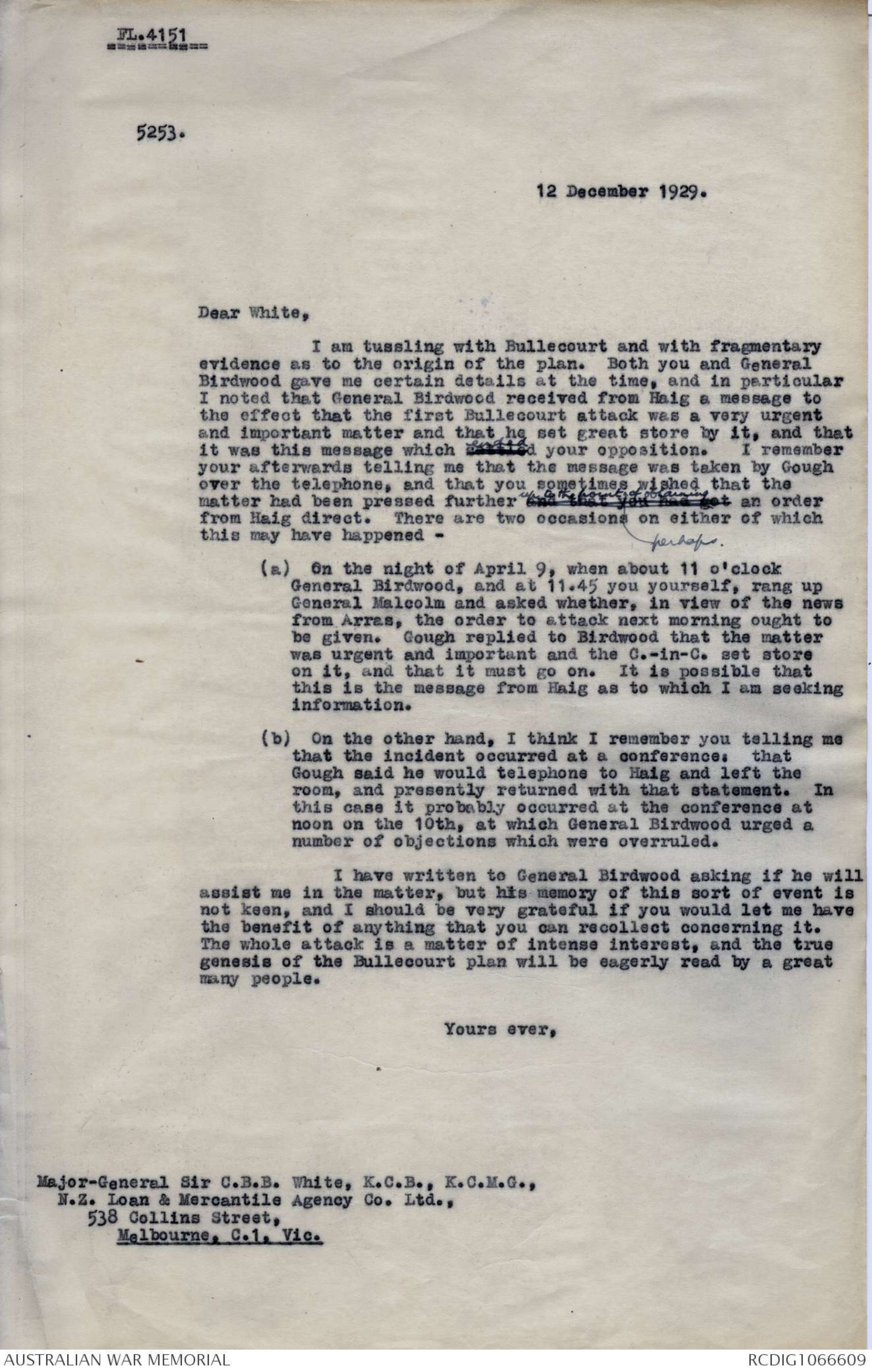
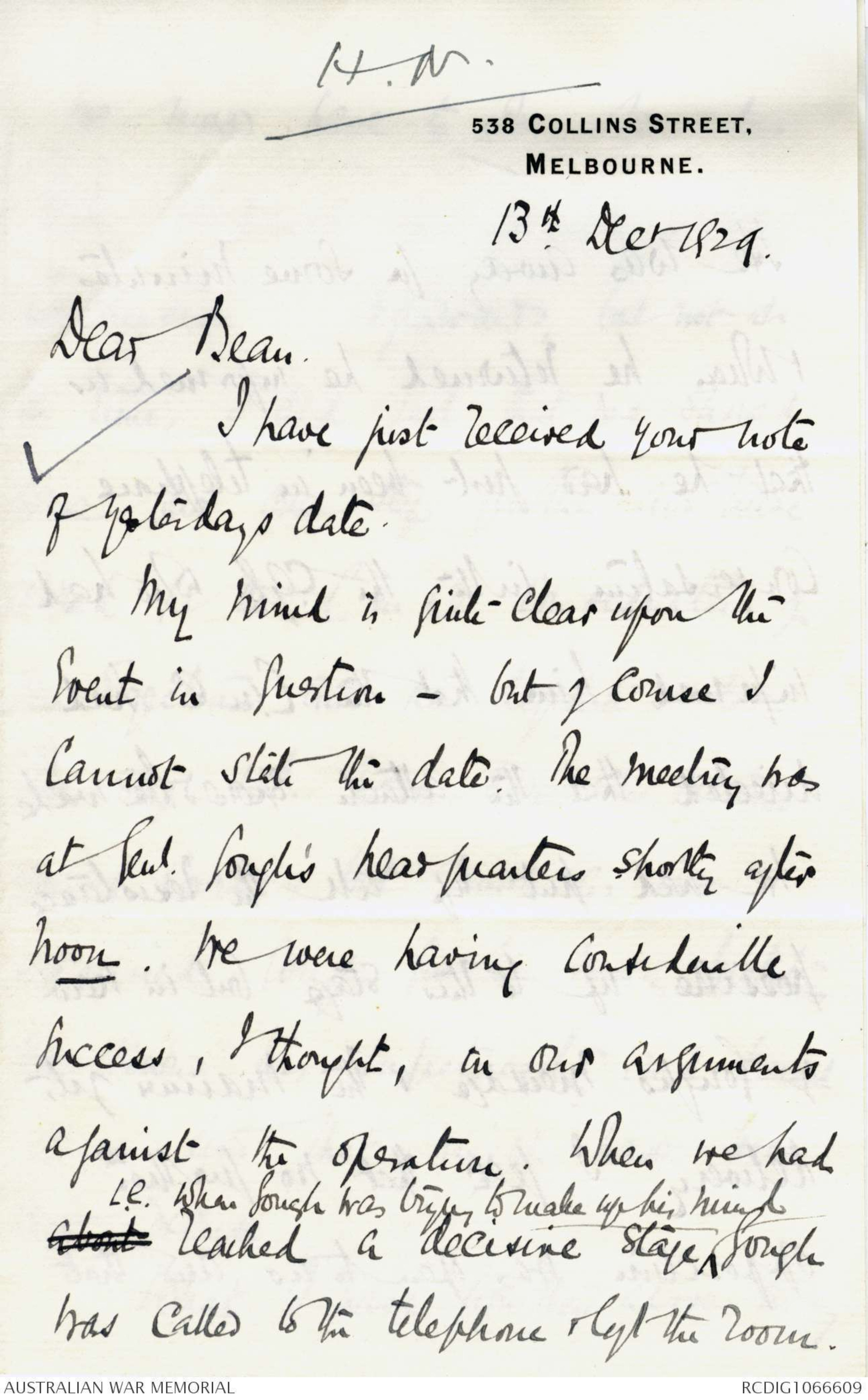
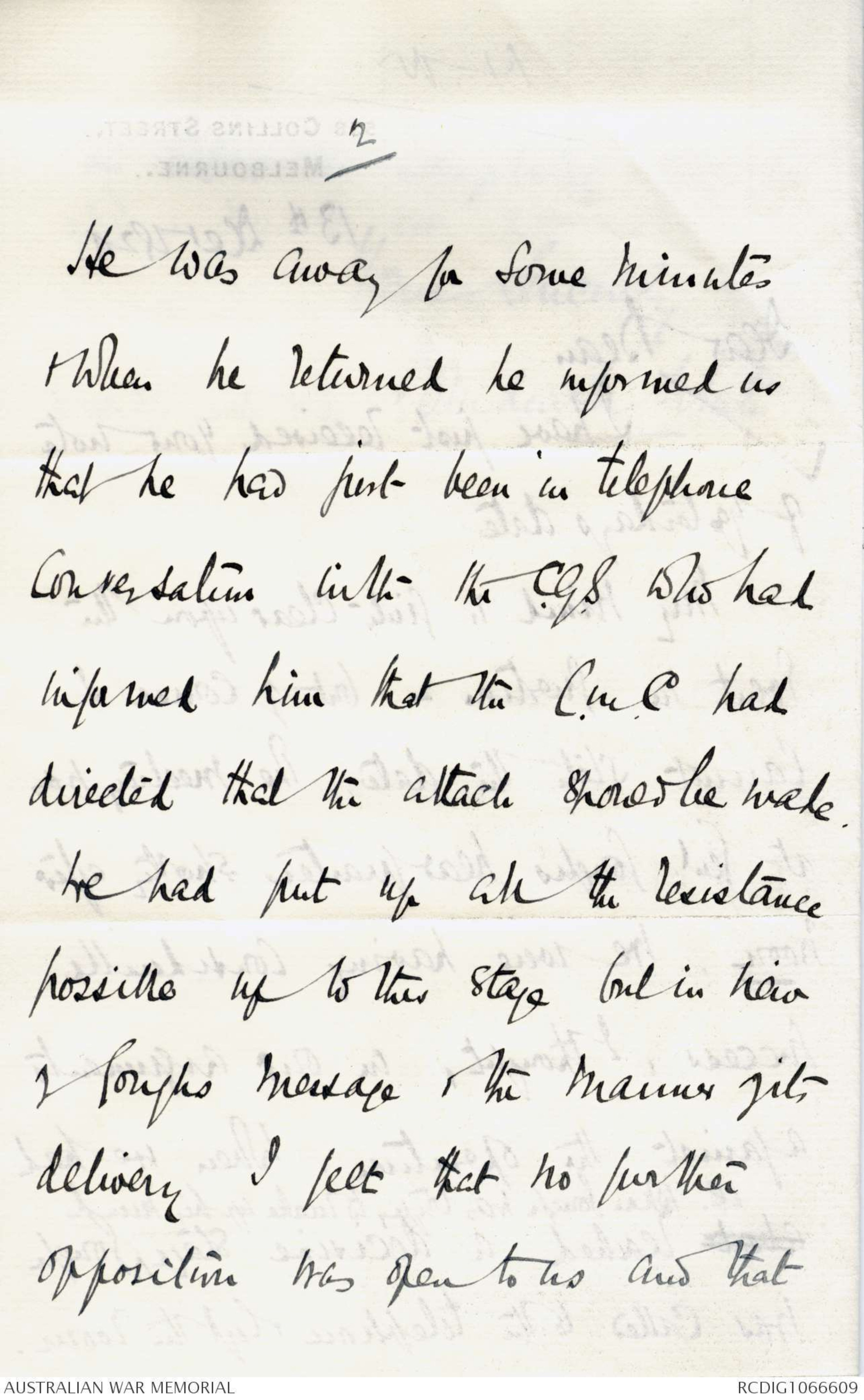
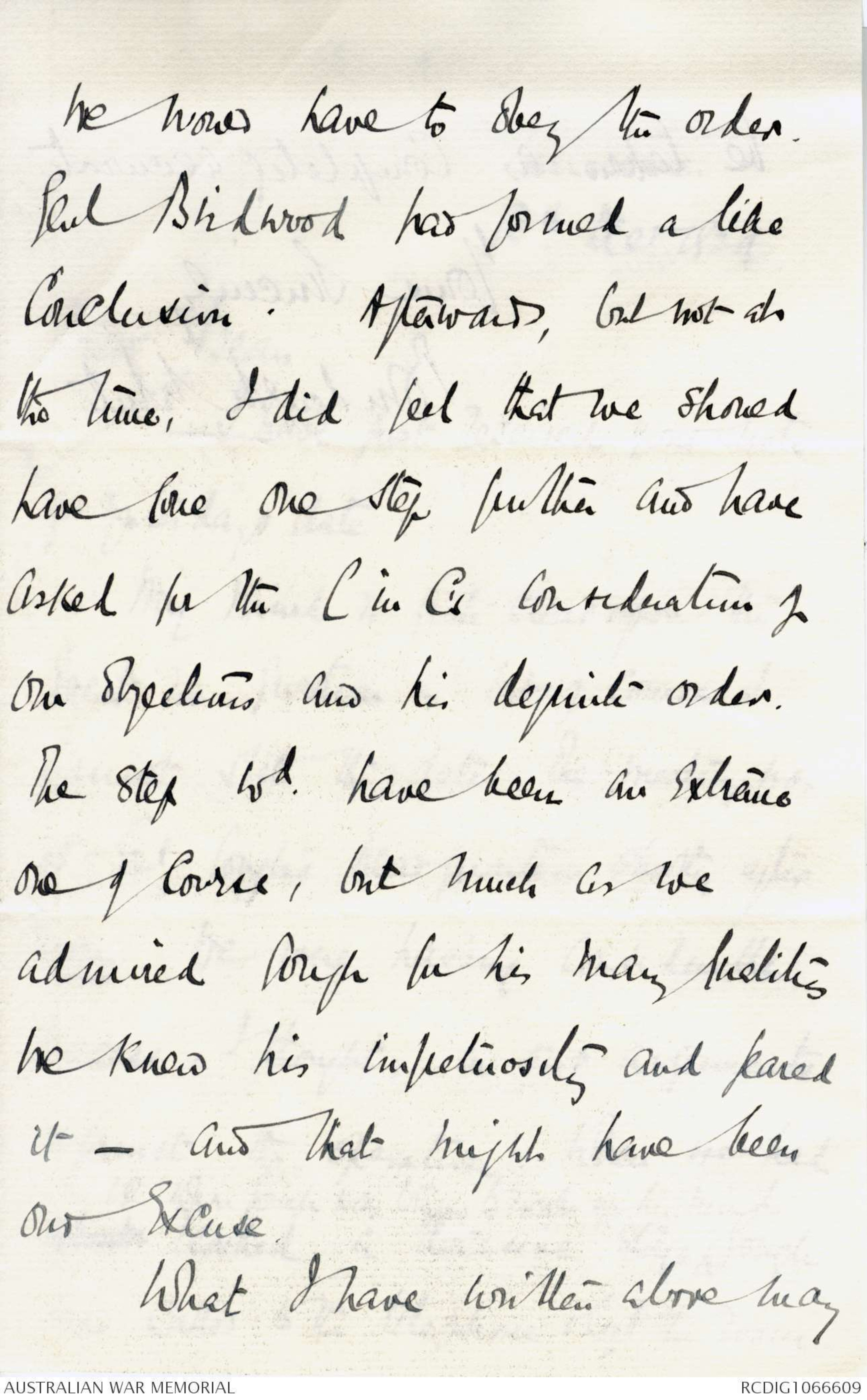
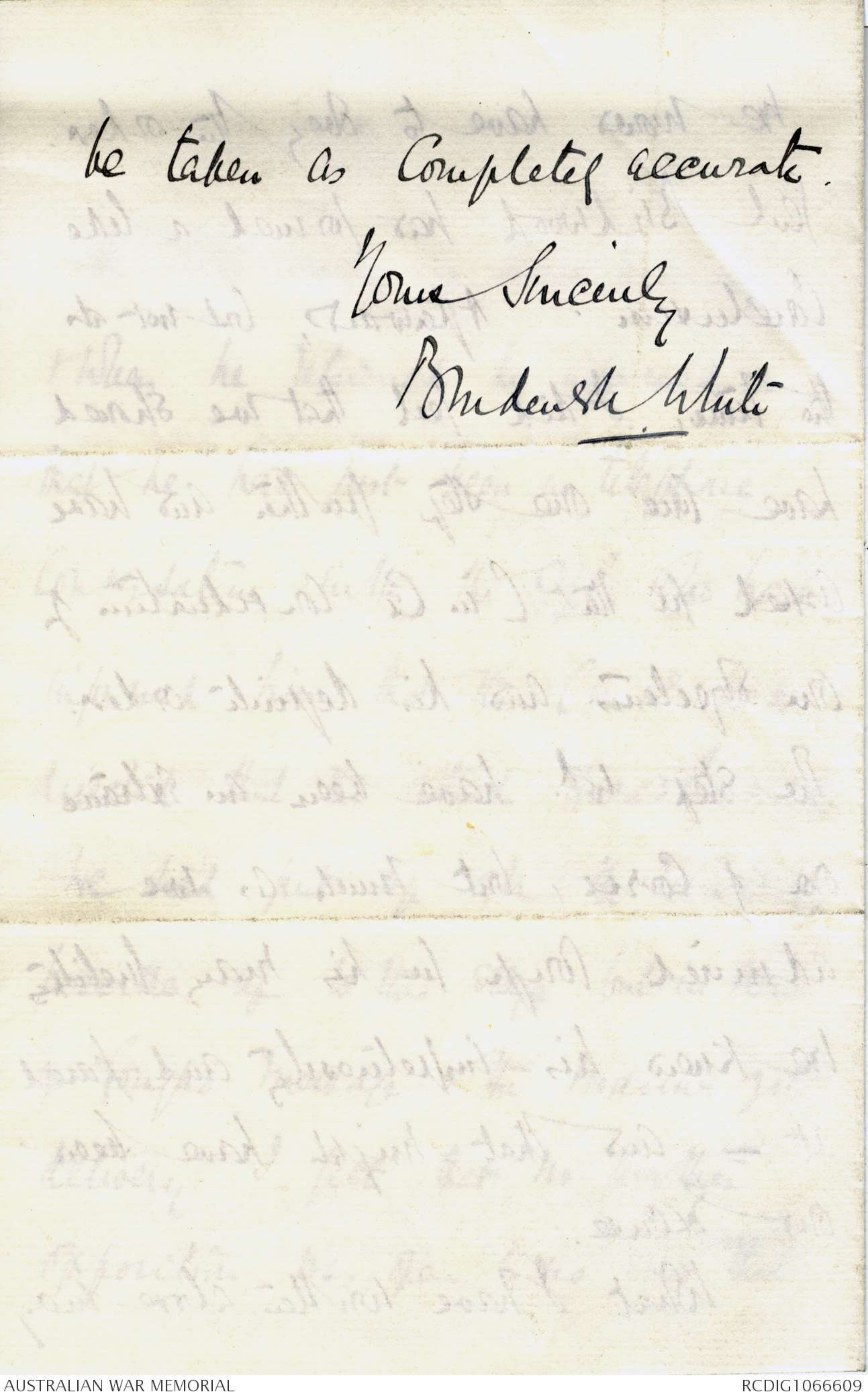
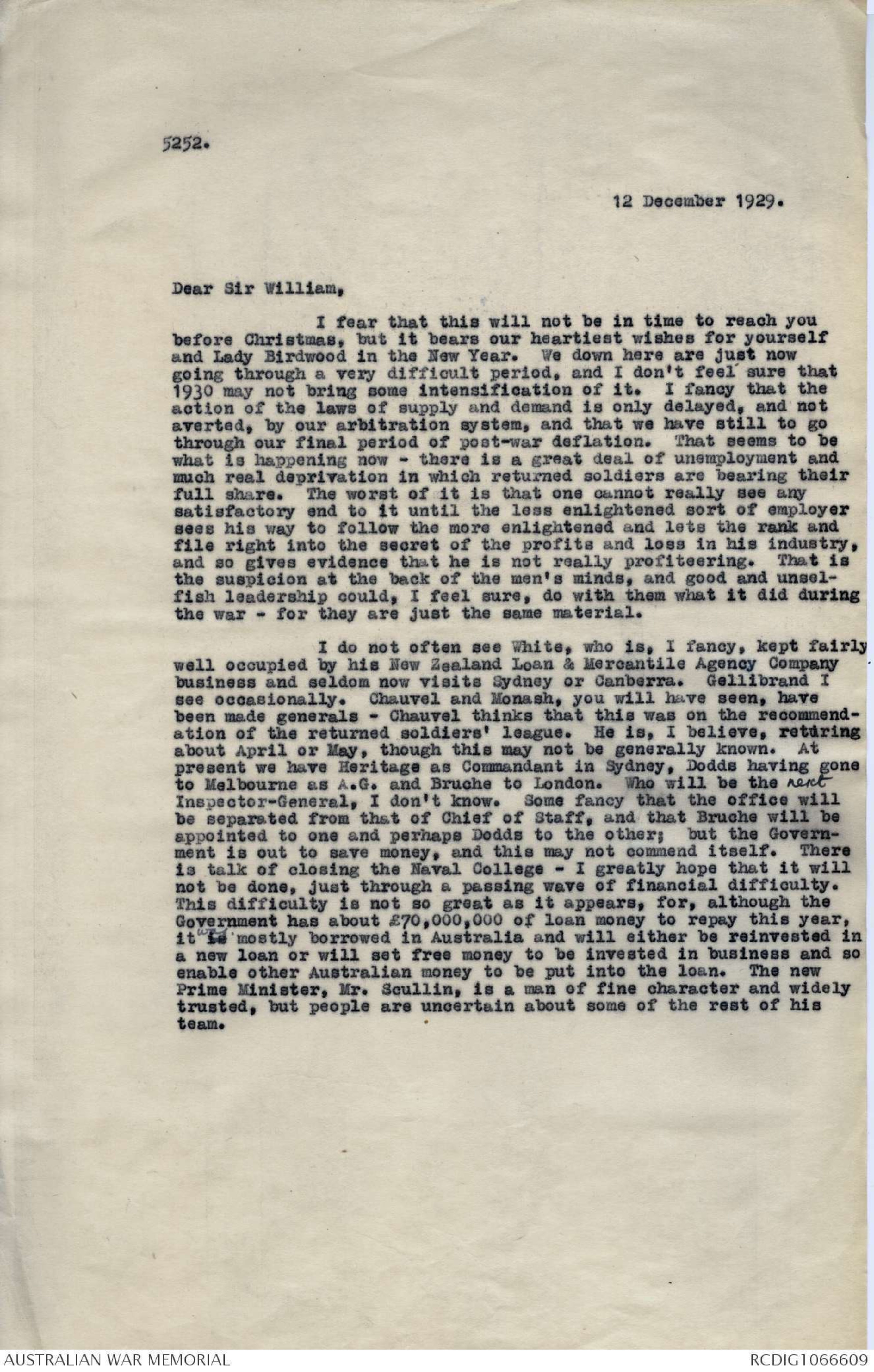
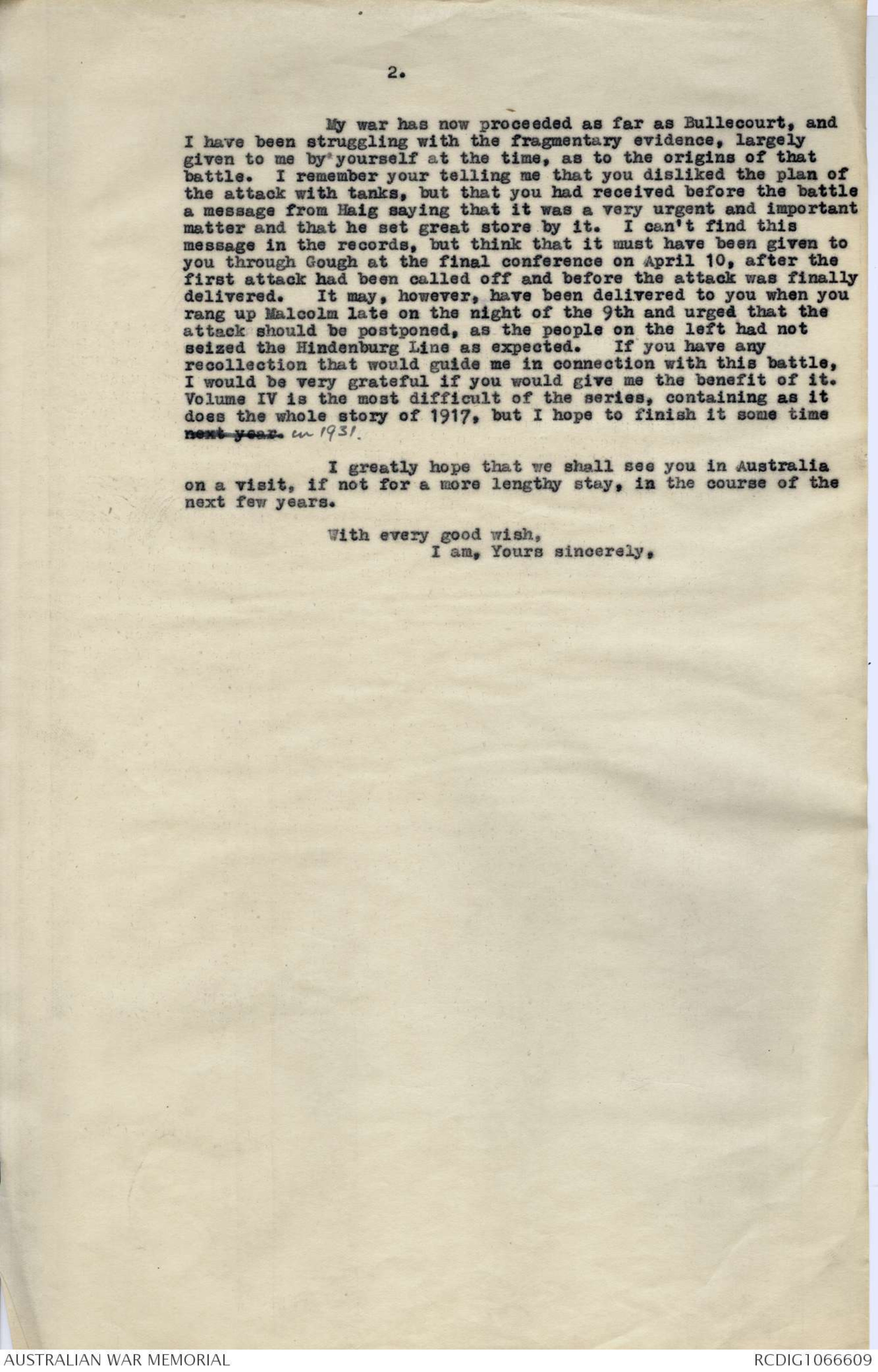
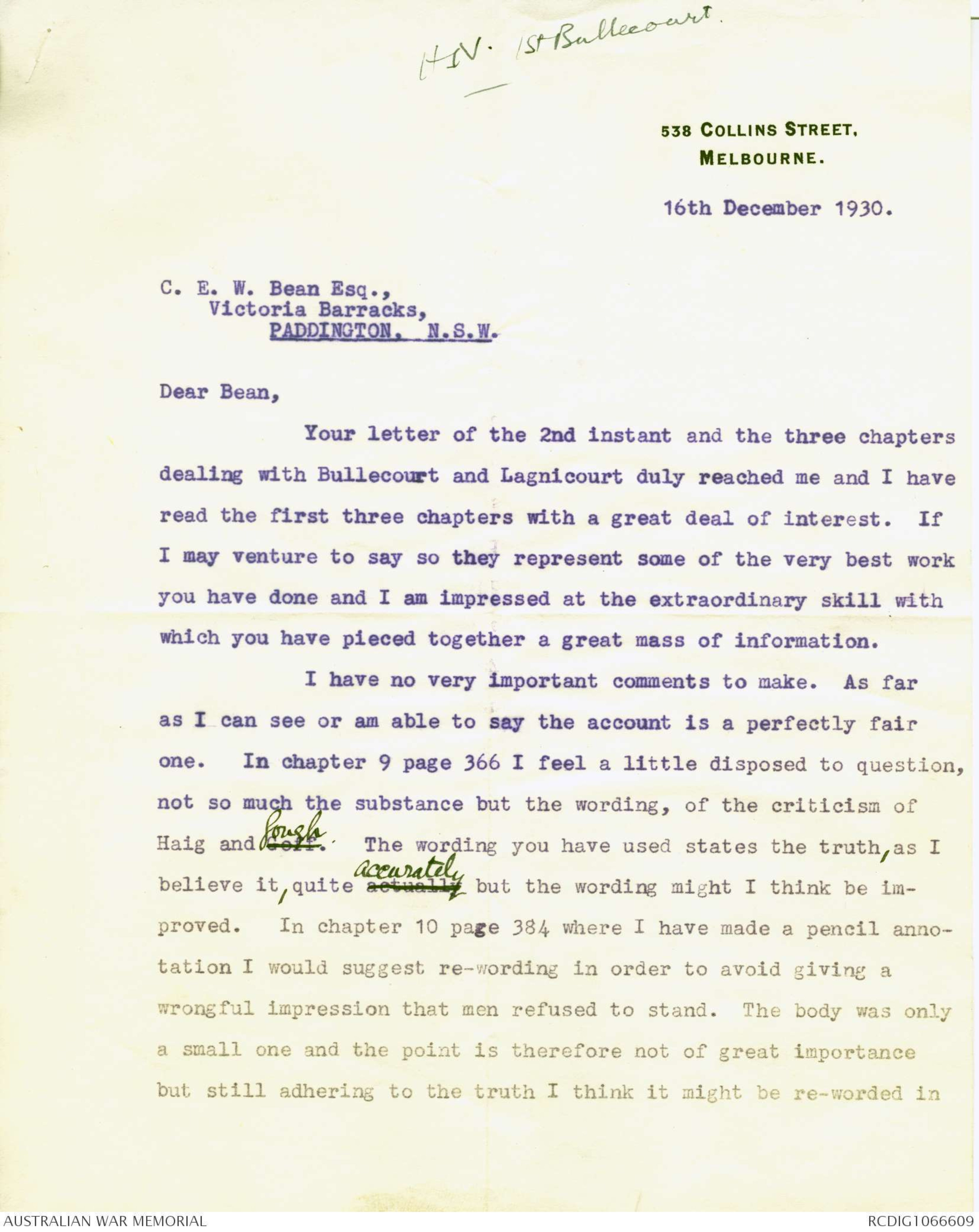
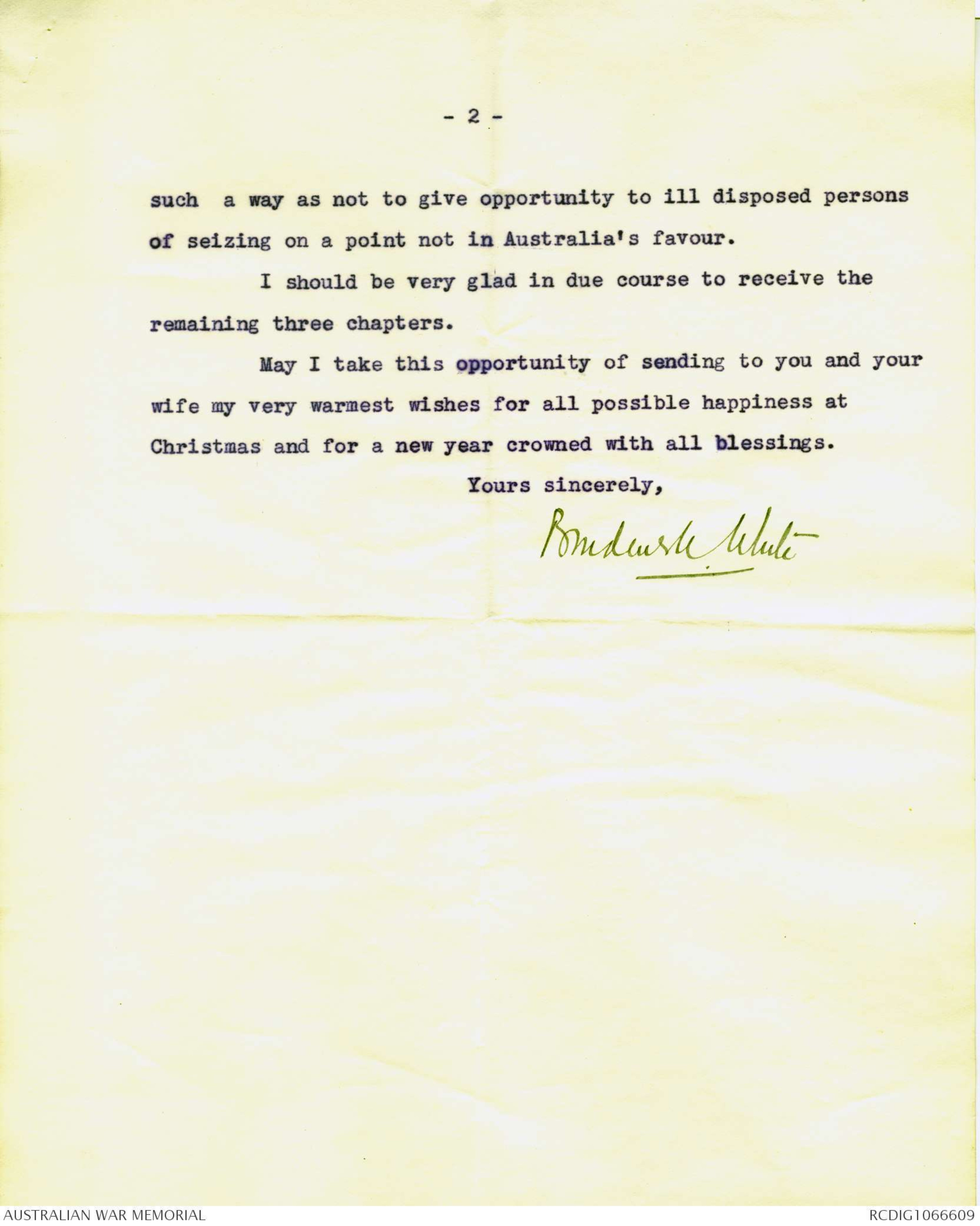
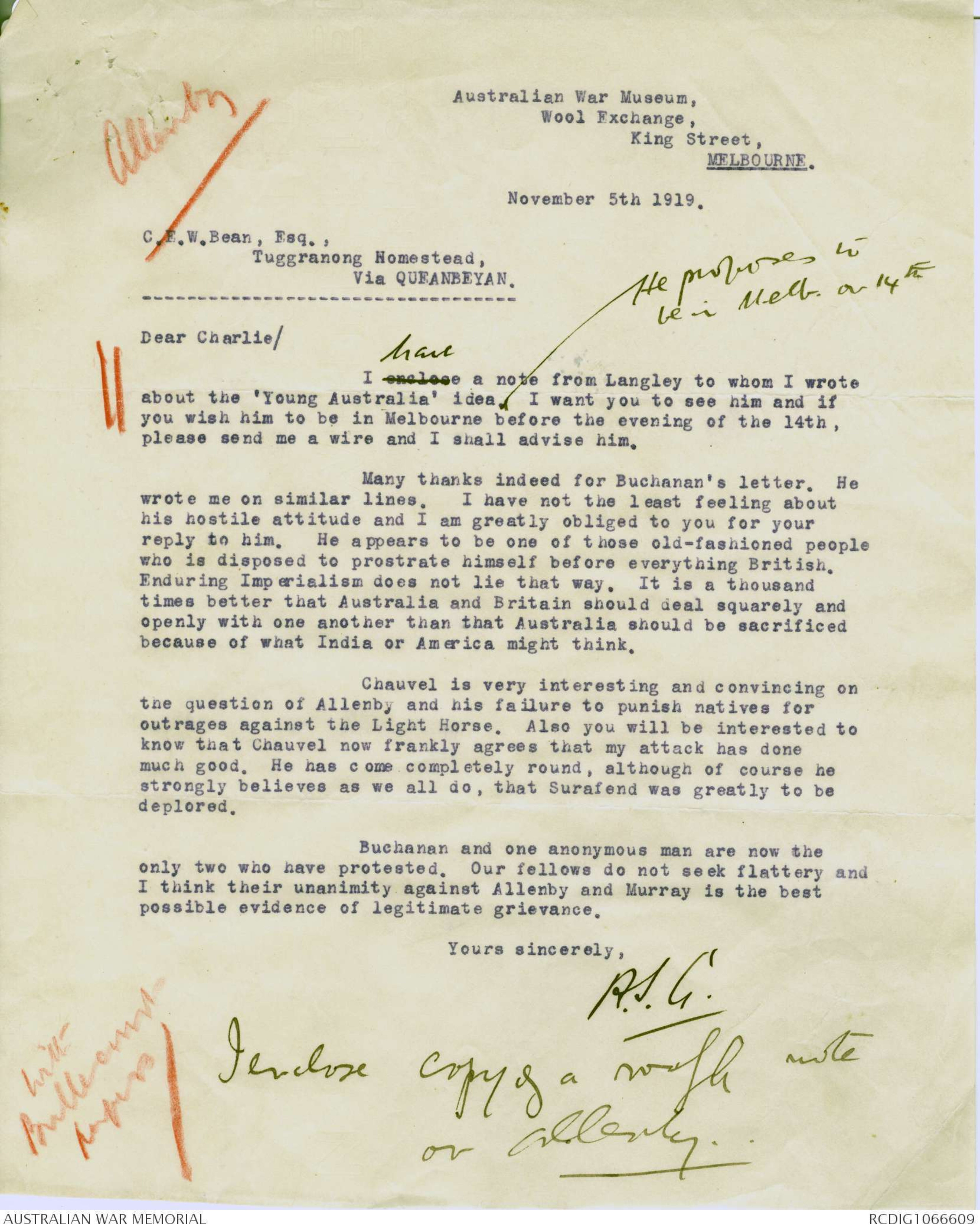
FL.4151
5253.
12 December 1929.
Dear White,
I am tussling with Bullecourt and with fragmentary
evidence as to the origin of the plan. Both you and General
Birdwood gave me certain details at the time, and in particular
I noted that General Birdwood received from Haig a message to
the effect that the first Bullecourt attack was a very urgent
and important matter and that he set great store by it, and that
it was this message which settled ended your opposition. I remember
your afterwards telling me that the message was taken by Gough
over the telephone, and that you sometimes wished that the
matter had been pressed further and that you had got up to the point perhaps of obtaining an order
from Haig direct. There are two occasions on either of which
this may have happened -
(a) On the night of April 9, when about 11 o'clock
General Birdwood, and at 11-45 you yourself, rang up
General Malcolm and asked whether, in view of the news
from Arras, the order to attack next morning ought to
be given. Gough replied to Birdwood that the matter
was urgent and important and the C.-in-C. set store
on it, and that it must go on. It is possible that
this is the message from Haig as to which I am seeking
information.
(b) On the other hand, I think I remember you telling me
that the incident occurred at a conference: that
Gough said he would telephone to Haig and left the
room, and presently returned with that statement. In
this case it probably occurred at the conference at
noon on the 10th, at which General Birdwood urged a
number of objections which were overruled.
I have written to General Birdwood asking if he will
assist me in the matter, but his memory of this sort of event is
not keen, and I should be very grateful if you would let me have
the benefit of anything that you can recollect concerning it.
The whole attack is a matter of intense interest, and the true
genesis of the Bullecourt plan will be eagerly read by a great
many people.
Yours ever,
Major-General Sir C.B.B. White, K.C.B., K.C.M.G.,
N.Z. Loan & Mercantile Agency Co. Ltd.,
538 Collins Street
Melbourne, C.1. Vic.
[*H.N.*]
538 COLLINS STREET,
MELBOURNE.
13th Dec 1929
Dear Bean
√ I have just received your note
of yesterdays date.
My mind is quite clear upon the
event in question - but of course I
cannot state the date. The meeting was
at Genl. Gough's headquarters shortly after
noon. We were having considerable
success, I thought, in our arguments
against the operation. When we hadabout reached a decisive stage ^i.e. When Gough was trying to make up his mind Gough
was called to the telephone & left the room.
2
He was away for some minutes
& when he returned he informed us
that he had just been in telephone
conversation with the C.G.S. who had
informed him that the C.in.C had
directed that the attack should be made.
We had put up all the resistance
possible up to this stage but in view
of Goughs message & the manner of its
delivery I felt that no further
opposition was open to us and that
we now have to obey the order.
Genl Birdwood has formed a like
conclusion. Afterwards, but not at
the time. I did feel that we should
have gone one step further and have
asked for the C in C's consideration of
our objections and his definite order.
The step wd. have been an extreme
one of course, but much as we
admired Gough for his many qualities
we knew his impetuosity and feared
it – and that might have been
our excuse.
What I have written above may
be taken as completel accurate.
Yours Sincerely
Brudenell White
1057
5252.
12 December 1929.
Dear Sir William,
I fear that this will not be in time to reach you
before Christmas, but it bears our heartiest wishes for yourself
and Lady Birdwood in the New Year. We down here are just now
going through a very difficult period, and I don't feel sure that
1930 may not bring some intensification of it. I fancy that the
action of the laws of supply and demand is only delayed, and not
averted, by our arbitration system, and that we have still to go
through our final period of post-war deflation. That seems to be
what is happening now - there is a great deal of unemployment and
much real deprivation in which returned soldiers are bearing their
full share. The worst of it is that one cannot really see any
satisfactory end to it until the less enlightened sort of employer
sees his way to follow the more enlightened and lets the rank and
file right into the secret of the profits and loss in his industry,
and so gives evidence that he is not really profiteering. That is
the suspicion at the back of the men's minds, and good and unselfish
leadership could, I feel sure, do with them what it did during
the war - for they are just the same material.
I do not often see White, who is, I fancy, kept fairly
well occupied by his New Zealand Loan & Mercantile Agency Company
business and seldom now visits Sydney or Canberra. Gellibrand I
see occasionally. Chauvel and Monash, you will have seen, have
been made generals - Chauvel thinks that this was on the recommendation
of the returned soldiers’ league. He is, I believe, retiring
about April or May, though this may not be generally known. At
present we have Heritage as Commandant in Sydney, Dodds having gone
to Melbourne as A.G. and Bruche to London. Who will be the next
Inspector-General, I don't know. Some fancy that the office will
be separated from that of Chief of Staff, and that Bruche will be
appointed to one and perhaps Dodds to the other; but the Government
is out to save money, and this may not commend itself. There
is talk of closing the Naval College - I greatly hope that it will
not be done, just through a passing wave of financial difficulty.
This difficulty is not so great as it appears, for, although the
Government has about ₤70,000,000 of loan money to repay this year
it is was mostly borrowed in Australia and will either be reinvested in
a new loan or will set free money to be invested in business and so
enable other Australian money to be put into the loan. The new
Prime Minister, Mr. Scullin, is a man of fine character and widely
trusted, but people are uncertain about some of the rest of his
team.
2.
My war has now proceeded as far as Bullecourt, and
I have been struggling with the fragmentary evidence, largely
given to me by yourself at the time, as to the origins of that
battle. I remember your telling me that you disliked the plan of
the attack with tanks, but that you had received before the battle
a message from Haig saying that it was a very urgent and important
matter and that he set great store by it. I can't find this
message in the records, but think that it must have been given to
you through Gough at the final conference on April 10, after the
first attack had been called off and before the attack was finally
delivered. It may, however, have been delivered to you when you
rang up Malcolm late on the night of the 9th and urged that the
attack should be postponed, as the people on the left had not
seized the Hindenburg Line as expected. If you have any
recollection that would guide me in connection with this battle,
I would be very grateful if you would give me the benefit of it.
Volume IV is the most difficult of the series, containing as it
does the whole story of 1917, but I hope to finish it some timenext year in 1931.
I greatly hope that we shall see you in Australia
on a visit, if not for a more lengthy stay, in the course of the
next few years.
With every good wish,
I am, Yours sincerely,
[*HN. 1st Bullecourt*]
538 COLLINS STREET.
MELBOURNE.
16th December 1930.
C. E. W. Bean Esq.,
Victoria Barracks
PADDINGTON. N.S.W.
Dear Bean,
Your letter of the 2nd instant and the three chapters
dealing with Bullecourt and Lagnicourt duly reached me and I have
read the first three chapters with a great deal of interest. If
I may venture to say so they represent some of the very best work
you have done and I am impressed at the extraordinary skill with
which you have pieced together a great mass of information.
I have no very important comments to make. As far
as I can see or am able to say the account is a perfectly fair
one. In chapter 9 page 366 I feel a little disposed to question,
not so much the substance but the wording, of the criticism of
Haig and Goff Gough. The wording you have used states the truth, as I
believe it, quite actually accurately but the wording might I think be improved.
In chapter 10 page 384 where I have made a pencil annotation
I would suggest re-wording in order to avoid giving a
wrongful impression that men refused to stand. The body was only
a small one and the point is therefore not of great importance
but still adhering to the truth I think it might be re-worded in
-2-
such a way as not to give opportunity to ill disposed persons
of seizing on a point not in Australia’s favour.
I should be very glad in due course to receive the
remaining three chapters.
May I take this opportunity of sending to you and your
wife my very warmest wishes for all possible happiness at
Christmas and for a new year crowned with all blessings.
Yours sincerely,
Brudenell White
[*Allenby*]
Australian War Museum,
Wool Exchange,
King Street,
MELBOURNE.
November 5th 1919.
C.E.W. Bean, Esq.,
Tuggranong Homestead,
Via QUEANBEYAN.
Dear Charlie/
I enclose have a note from Langley to whom I wrote
about the 'Young Australia’ idea. He proposes to be in Melb. on 14th I want you to see him and if
you wish him to be in Melbourne before the evening of the 14th,
please send me a wire and I shall advise him,
Many thanks indeed for Buchanan's letter. He
wrote me on similar lines. I have not the least feeling about
his hostile attitude and I am greatly obliged to you for your
reply to him. He appears to be one of those old-fashioned people
who is disposed to prostrate himself before everything British.
Enduring Imperialism does not lie that way. It is a thousand
times better that Australia and Britain should deal squarely and
openly with one another than that Australia should be sacrificed
because of what India or America might think,
Chauvel is very interesting and convincing on
the question of Allenby and his failure to punish natives for
outrages against the Light Horse. Also you will be interested to
know that Chauvel now frankly agrees that my attack has done
much good. He has come completely round, although of course he
strongly believes as we all do, that Surafend was greatly to be
deplored,
Buchanan and one anonymous man are now the
only two who have protested. Our fellows do not seek flattery and
I think their unanimity against Allenby and Murray is the best
possible evidence of legitimate grievance.
Yours sincerely,
R.S.G.
[*With
Bullecourt
papers
I enclose copy of a rough note
or Allenby.*]
 Deb Parkinson
Deb ParkinsonThis transcription item is now locked to you for editing. To release the lock either Save your changes or Cancel.
This lock will be automatically released after 60 minutes of inactivity.